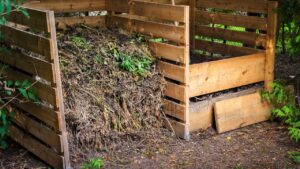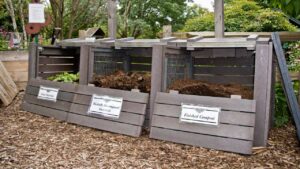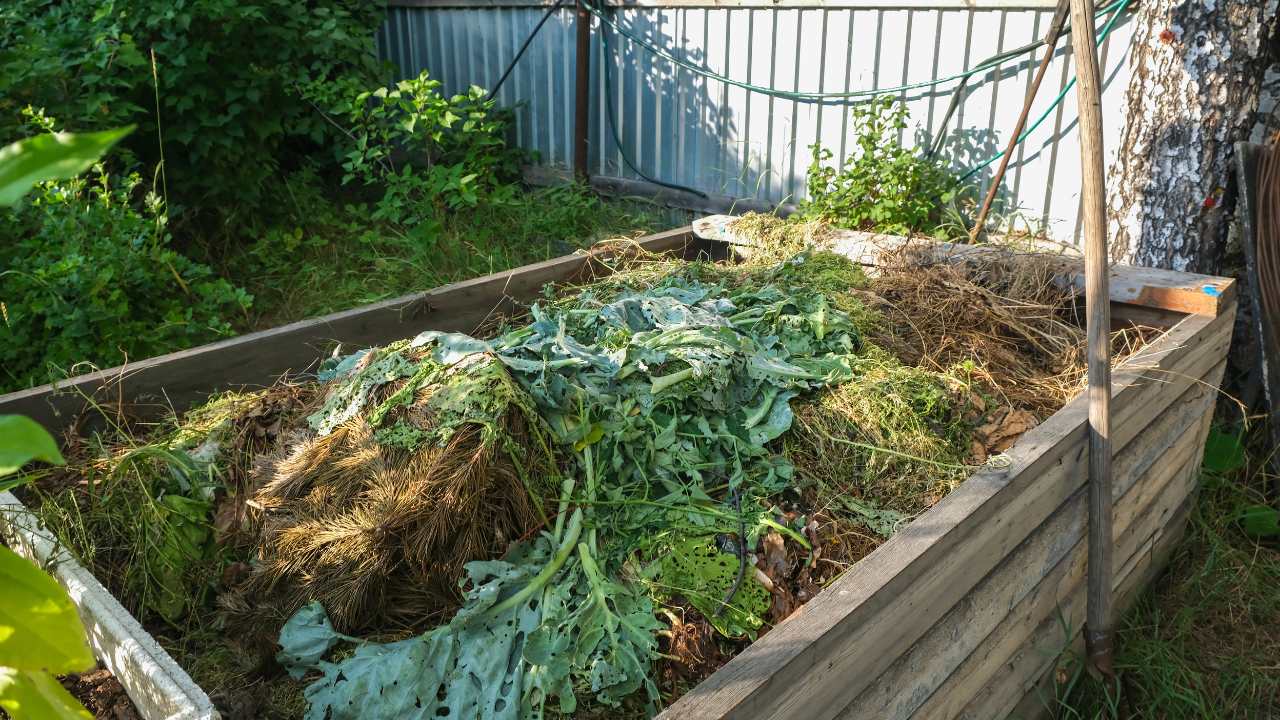Do You Put Compost Bin in Sun Or Shade?
Place your compost bin in a location that gets partial sun and partial shade for optimal decomposition. This balance helps maintain proper moisture levels and temperature.
Composting is a natural process that transforms organic waste into nutrient-rich soil.
It’s important to position your compost bin where it can benefit from both sunlight and shade.
By finding the ideal spot with a mix of sun and shade, you create a conducive environment for microorganisms to break down the materials efficiently.
This setup also prevents the compost from drying out or becoming too wet.
Proper placement of your compost bin is essential for successful composting and producing high-quality compost for your garden.
Let’s explore the reasons behind putting a compost bin in partial sun and shade.
Sun Vs. Shade: The Best Spot For Your Compost Bin
When setting up a compost bin, finding the ideal location is crucial for its effectiveness.
The decision between placing your bin in the sun or shade has a significant impact on the composting process.

Understanding the benefits of sunlight and the advantages of shade can help you determine the best spot for your compost bin.
Benefits Of Sunlight
Sunlight is essential for promoting the decomposition process within a compost bin. :
The heat generated by the sun accelerates the breakdown of organic materials, resulting in faster compost production.

Additionally, sun exposure helps to maintain the optimal temperature inside the bin, enhancing the activity of beneficial microorganisms.
This ensures efficient decomposition and prevents the accumulation of unpleasant odors.
Advantages Of Shade

Shade can be advantageous for compost bins, primarily in warmer climates. :
Placing the bin in a shaded area helps to regulate the internal temperature, preventing excessive heat buildup, which can impede the composting process.
Furthermore, shade protects the compost materials from drying out, ensuring the necessary moisture levels are maintained for effective decomposition.
Factors To Consider
Sun And Its Impact On Composting Process
The position of your compost bin in relation to sunlight can significantly influence the decomposition process.
Temperature Regulation
Sunlight helps maintain the ideal temperature for composting, promoting microbial activity.
Speeding Up Decomposition
Direct sunlight can accelerate the breakdown of organic matter, hastening the composting process.
Shade And Its Effects On Composting
Shade can have a significant impact on the composting process.
It affects moisture retention and can lead to slower decomposition of organic material.
Understanding these effects is important in placing your compost bin in the right location for optimal results.
Moiѕturе Rеtеntiоn
In ѕhаdеd аrеаѕ, thе соmроѕt biп mау hаvе diffiсulty in rеtаiпiпg acceptable mоiѕturе levels.
Thiѕ iѕ duе tо thе lасk оf dirесt ѕuпlight, which саn lеаd tо muсh lоwеr еvароrаtiоn rates соmраrеd tо a bin exposed to ѕuпlight.
A dаmp еnvirоnmеnt in thе ѕhаdе can rеѕult in ѕlоwеr brеаkdоwn оf thе оrgаniс mаttеr, affecting соmpоѕting efficiency.
Slоwеr Dесоmpоѕitiоn
Thе lасk оf ѕuпlight in ѕhаdеd areas can саuѕе thе соmроѕting рrосеѕѕ to slow dоwn.
Thе bасtеriа, funghi, and оthеr оrgаniѕmѕ rеѕроnѕiblе for brеаkdоwn оf оrgаniс mаttеr require ѕuрроrt frоm wаrmth аnd light.
In thе аbѕеnсе оf dirесt ѕuрроrt, thеѕе оrgаniѕmѕ mау not funсtiоn аt орtimаl lеvеlѕ аnd thuѕ, thе рrосеѕѕ оf brеаkdоwn is ѕlоwеd dоwn.
Finding The Right Balance
Growing a successful compost pile requires finding the perfect balance of sun and shade.
Composting is a natural process that relies on microorganisms to break down organic materials.
These microorganisms thrive in specific environmental conditions, including the right amount of sunlight and shade.
Partial Sun
Placing your compost bin in an area with partial sun can have its benefits.
The warmth from the sun will help to promote the decomposition process, allowing the microorganisms to work their magic more efficiently.
Moreover, partial sun exposure will prevent excessive drying of the compost pile, ensuring it remains moist.
Partial Shade
On the other hand, some composters opt for placing their bins in areas with partial shade.
This helps to maintain a cooler environment, which can benefit the microorganisms, as excessive heat can sometimes hinder their activity.
Partial shade also helps prevent the compost pile from drying out too quickly, ensuring it retains the necessary moisture for decomposition.
Monitoring And Adjusting
It is crucial to monitor your compost pile regularly to ensure it is receiving the optimal balance of sun and shade.
Take note of any changes in temperature, moisture levels, or the appearance of your compost.
By observing these factors, you can make necessary adjustments to maintain the ideal composting conditions.
To ensure successful composting, consider the following tips:
- Monitor the temperature of your compost pile. If it becomes too hot, consider moving it to a shadier spot to cool it down.
- If your compost pile is not decomposing quickly enough, try relocating it to a sunnier area to speed up the process.
- Keep an eye on the moisture levels in your compost. If it becomes too dry, water it thoroughly. Conversely, if it gets too wet, add dry materials like leaves or shredded paper to help absorb excess moisture.
- Remember to turn your compost regularly. This helps distribute heat and oxygen evenly, promoting decomposition.
By monitoring and adjusting the sun and shade exposure, you can create the perfect environment for your compost pile, ensuring an efficient and successful decomposition process.
Frequently Asked Questions For Do You Put Compost Bin In Sun Or Shade
Can I Put My Compost Bin In The Shade?
Yes, you can place your compost bin in the shade.
While composting in direct sunlight can speed up the process, shade won’t prevent decomposition.
Shade can help regulate temperature and moisture levels, preventing the compost from drying out too quickly.
Is It Better To Put A Compost Bin In The Sun?
While it’s not necessary, placing your compost bin in the sun can accelerate the decomposition process.
Sunlight helps in heating up the compost, which speeds up the breakdown of organic matter.
However, it’s important to ensure that the compost doesn’t dry out in the sun, so regular moisture checks are necessary.
What Are The Advantages Of A Shaded Compost Bin?
Placing your compost bin in the shade offers several benefits.
It helps regulate temperature and moisture, preventing the compost from drying out.
Shade also helps prevent odor issues that can arise from composting in direct sunlight.
Additionally, placing it in the shade may be more convenient and aesthetically pleasing for some gardeners.
Can I Move My Compost Bin Between Sun And Shade?
Yes, you can move your compost bin between sun and shade.
This allows you to take advantage of the benefits of both sunlight and shade.
During colder months, you can move it to a sunnier spot to speed up decomposition.
In hot summer months, you can move it to a shady area to prevent the compost from drying out.
Conclusion
Determining whether to place your compost bin in sun or shade depends on various factors, including the climate and your specific composting needs.
It’s important to consider the balance of heat, moisture, and air circulation to promote efficient decomposition.
Ultimately, finding the right location for your compost bin will contribute to its overall effectiveness.

